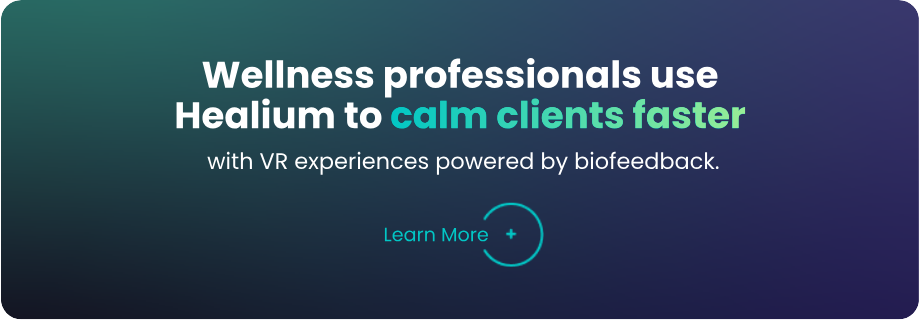The Mental Health Benefits of Virtual Reality & Immersive Media
VR is the next frontier, and its potential to impact our mental health is only now being understood. Learn more about how you can use VR for mental wellness here.

Virtual Reality is a remarkable technology that fully immerses users inside digital worlds, providing an extreme close-up and all-encompassing visualization experience to the users. To some, this might seem novel or gimmicky, but we’re here to tell you that virtual reality is not going away any time soon.
How exactly will this immersive tech benefit you?
When leveraged properly, the immersive qualities of augmented and virtual reality bring some truly groundbreaking mental health benefits to users.
At Healium, for example, we aim to use these tools to improve mental fitness.
By immersing users in meditative experiences (supplemented by neurofeedback ), users can become more self-aware of their brainwaves and mental fitness at large.

Defining “Immersive Media”
As augmented and virtual reality applications continue to develop, you’ll see this term work its way into a variety of different contexts. Simply put, immersive media is any form of media that utilizes a computer-simulated environment to simulate physical presence in imagined settings.
It allows users to interact with content on a deeper, more realistic level than other forms of traditional media. Users can actually engage and interact with the objects inside the experience, resulting in a sensory experience that may include sight, touch, hearing, smell, or even taste.
At Healium, we use neurofeedback and biofeedback wearables to track brainwave data in real time as users go through meditation experiences. We also take user interaction to the next level by making the virtual reality environment change based on the user’s brainwaves.
The results? A groundbreaking new method to self-manage stress and anxiety, achieve better sleep, foster mindfulness and inner calm, and elevate your levels of empathy.
What’s the Difference Between AR and VR?

The terms virtual reality (VR) and augmented reality (AR) sound similar, and as technology advances, they continue to blend. We’ve written an entire blog post about AR vs. VR, but we’ll summarize it nicely below:
– Augmented reality (AR) allows users to interact with the actual environment in a way that has been digitally altered. It uses the camera of a smartphone or transparent glasses to add digital features to reality.
– Virtual Reality (VR) offers a 360-degree, fully simulated experience that can be quite close to the actual world (or entirely different from it). It is typically presented to users through virtual reality goggles like the Meta Quest 2 .
The Effects of VR and AR on Mental Health & the Brain
The cells in your brain, known as neurons, interact with each other through electricity. When neurons transmit messages to other neurons, it forms a pattern known as a brainwave .
According to Science Focus , virtual reality helps to enhance your brainwaves.
This makes sense because, after all, the brain believes what it sees. When engaging with content in virtual reality or augmented reality format, users are inherently less distracted and thus more engaged. Take this beach scene for instance.
When VR or AR content is tailored towards optimizing your brain, it can have a profoundly positive effect on the user. Healium’s immersive content is designed to elicit positive changes in brainwave patterns, improve sleep, lower stress, elevate empathy, and increase positive mood states.

These changes are achieved in large part due to the immersive nature of virtual and augmented reality, as well as approaching meditation from a data-driven, scientifically proven point of view to allow the user to treat the process of optimizing their brain like they would a workout session.
Brainwaves 101: Which Brainwaves Affect Your Mental Health?


Why focus on your brainwaves? Well, irregularities in brain functioning can impact the development of certain illnesses as well as your mood states and mental fitness overall.
We’ve elicited the help of Dr. Jeff Tarrant of the Neuromeditation Institute in a previous blog to give us a rundown of brainwaves and their functions , but we’ll also provide a summary below:
– Alpha Waves: When you’re not concentrating too hard on something, your brain creates alpha waves. You’re probably calm and relaxed regardless of what you’re doing. These waves have a frequency of 8 to 12 Hz.
– Beta Waves: You’re wide awake, attentive, and concentrated when you have these brain waves. You are going about your everyday tasks and making decisions. Higher-frequency beta waves, measuring between 12 and 35 Hz, are produced while your brain is in this state.
– Gamma Waves: When you’re actively processing information and learning, your brain creates the fastest of brain waves, the gamma waves. These brainwaves, which tend to register over 35 Hz, show that you’re focused and solving difficulties. They are also associate with meditative states.
The Rise of Digiceuticals & VR Therapy
 Virtual reality is widely used in gaming, the metaverse, AI, and other sophisticated and developing technology sectors. However, virtual reality’s contributions to medicine and healthcare are just as impressive.
Virtual reality is widely used in gaming, the metaverse, AI, and other sophisticated and developing technology sectors. However, virtual reality’s contributions to medicine and healthcare are just as impressive.
In fact, healthcare has been among the top businesses that have been early adopters of virtual reality technology , largely utilizing VR for mental health applications.
Additional sensory inputs can make VR a perfect setting for effective therapy, placing users in stimulating yet controlled surroundings, allowing tension, anxiety, and heavy sensations to be released.
In fact, Virtual Reality Therapy (VRT) is being increasingly utilized for patients suffering from various forms of trauma, including PTSD in veterans , by placing them in catered environments designed to help them confront their fears and heal.
Virtual reality has also opened up additional applications for these veterans. Healium’s team built a program called Honor Everywhere that uses VR to allow aging veterans the opportunity to virtually visit their memorials.
If you know of a veteran who would like a 360-degree tour of their memorial, contact your local Honor Flight hub or email honoreverywhere360@gmail.com .
Digiceuticals and VR therapy are now considered to be digital medications that are designed to help you improve your mental fitness by assisting you in better treating, managing, or preventing mental health problems.
How to Use Immersive Media to Manage Stress 
There are a plethora of options available for those who are interested in leveraging the power of new technology to improve their mental health!
Healium is the world’s first virtual reality mental wellness solution that offers VR and AR channels for the self-management of stress, allowing users to visualize their emotions using our unique technology, which integrates VR devices with neurofeedback wearables .
Self-management of stress, anxiety, empathy, positivity and even sleep quality are all areas where our application can help.
Simply put, Healium immerses users in virtual reality meditation experiences that (when paired with optional neurofeedback devices) allow users to visualize their brainwaves. This removes the mystery from meditation and grants users agency over their brain.
In other words, by tracking your brain data during experiences that are designed to help you de-stress, you can treat your brain like any other muscle and actively work to improve it.
Note: Healium is not intended to be used as a substitute for psychotropic medication or professional counseling; it’s not a diagnostic or treatment tool, and it won’t tell you if you’re suffering from anxiety or depression.
Healium is a self-awareness tool, a natural retreat, and a reminder that your thoughts have power—not just in the virtual world, but also in the real world.
Mental health is critical at all stages of life. As a result, having dependable strategies to boost our mental wellness is important.
About the Author
Sarah Hill, a former interactive TV news journalist at NBC, ABC, and CBS affiliates in Missouri, gained recognition for pioneering interactive news broadcasting using Google Hangouts. She is now the CEO of Healium, the world’s first biometrically powered VR channel, helping those with stress, anxiety, insomnia, and other struggles through biofeedback storytelling. With patents, clinical validation, and over seven million views, she has reshaped the landscape of immersive media.







